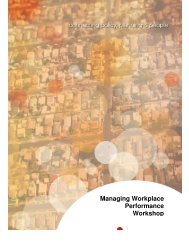Teenage Pregnancy Research Report - 3p Consulting
Teenage Pregnancy Research Report - 3p Consulting
Teenage Pregnancy Research Report - 3p Consulting
Create successful ePaper yourself
Turn your PDF publications into a flip-book with our unique Google optimized e-Paper software.
participating in education. The two most commonissues nominated were child care and transport.Many of the young parents did not complete year 12and their aspirations for employment often dependon reasonable levels of academic proficiency if theyare to continue onto to tertiary level. Service providersand employment agencies expressed the difficulty ofproviding adequate training to this cohort of teenageparents. In summary, as discuss the area of educationand training for pregnant and parenting teenagers iscomplex and requires further investigation.A significant number of participants (approximately athird) expressed personal aspirations for the future andthese focused on having stable, respectful, long termrelationship and having another child but only aftereverything else was “in order”- that is they had stableaccommodation (ideally their own home) and werefinancially secure.More detailed discussions about plans for the futureemerged in the focus group sessions and a general senseof dissatisfaction with their current situation articulated,particularly for those who were single parenting. Forinstance more than half of the group wanted to leaveLaunceston hoping for more opportunities in other places.Career options of interest included:• Nursing/Midwifery;• Hairdressing;• Cleaning;• Child carer; and• Chef/hospitality.Outcomes for ChildrenA significant proportion of parents interviewedexpressed a range of perceived developmental delayswith their children including physical and intellectualdevelopmental delays and in some cases, medicalconditions, behavioural issues and autism. Of the 14individual interviewees, two reported that their childrenwere autistic, one child was diagnosed with cerebralpalsy, one attended St Giles for behaviour managementand assessment for possible ADHD. It is unclear if thenumbers of parent reported conditions are diagnosedand if so, are at a higher proportion than the generalpopulation. As detailed in the <strong>Pregnancy</strong> section maternalmorbidity and mortality data does indicate that teenagersare more at risk of having low birth weight and prematurebabies and that these conditions are associated with arange of ongoing physical and intellectual issues. Thismay be an area that requires further research as ifthere are a greater proportion of children of teenagersthat require professional intervention and support theremaybe implications for resource allocation and serviceand program development and delivery.Children Protection and teenage parentsOne adverse outcome for the children of teenage parentscited in international literature is that children of teenageparents are over represented in the child protectionsystem. <strong>Research</strong> participants were not asked abouttheir experiences in relation to child protection, howeverservice providers, including cu@home and PYPS workersindicated that a proportion of their clients were in contactwith child protection services.The researchers were unable to obtain data to investigatethis risk in the local or Tasmanian context. We receivedadvice from Children and Youth Services (DHHS) thatthere are a number of confounding factors regarding thisissue which could not be satisfactorily addressed withinthe required timeframe. These issues included:• The close association between socio-economicstatus and maternal age as well as socio-economicstatus and involvement with child protection services;• The high mobility of teenage parents;• A lack of high quality data; and• The impact of access to support services such ascu@home.86



